雅思口语Part1答案:Hometown家乡
雅思口语Part One思路解析:Hometown 关于家乡的问题.doc

雅思口语Part One思路解析:Hometown 关于家乡的问题关于家乡的问题可以说几乎是雅思口语考官逢考必问的话题范围。
相应的问题则有:What’s (the name of) your hometown? 当然这个问题可能在考官抛出Where are you from?(你来自哪里?)之后问道The name of my hometown is called YC, which was originated from a famous person in Three Kingdoms Time.Is that a big city or a small place?你的家乡是个大的城市还是一个小地方?Well, my hometown is YC, which is a relatively small city compared to Beijing, Shanghai and those metropolitan cities. It’s only an hour’s ride to get to one corner from the farthest place within YC.Please describe your hometown a little能否描述一下你的家乡呢?My hometown is a third-tier city(三线城市)in China. The city is not so big, sometimes one-hour-trip time in Beijing from Haidian to Chaoyang will highly possibly take you to another county in YC city. So, I am pretty comfortable with the less time-consuming living pace. This article is from laokaoya website. Apart from that, my hometown is known as the biggest water damn in the world. Some have criticised this project for ages, but I think it’s been producing a lot of electricity to the whole nation, which is at least not bad right now.How long have you lived there?你在你的家乡住了多久了?I’ve been living there for nearly two decades. I left this city after graduation from my senior high school. I could still remember the old streets and buildings, but now things changed totally.Do you like it?你喜欢你的家乡吗?你也可以Describe a tall building in your hometown you like 《《《()Yes, I love my hometown just like I love my parents. It’s a place that saw mygrowth and gave me countless happy memories.Do you like living there?你喜欢居住在这里吗?(其实这个问题和上面的那个你时候喜欢你的家乡有很多相同之处,如果考官同时问题到的时候当然最好不要答一样的,尝试从另一个角度思考问题。
雅思口语第一部分话题

V ip Part 1 高频话题1. Study or Work 学习或工作a) Are you a student or working?b) Why did you choose this major / job ?c) Which part of your studies/job do you find most interesting?d) What is the most difficult part of your studies/job?e) What do you hope to do when you finish your studies?f) Do you prefer to work alone or in a group?2. Flat or House公寓或房屋a) What can you see outside the window of your house?b) Who do you live with?c) How long have you lived in your house?d) What is there on the wall in your house?e) Which room in your house do you like best?f) Describe your bedroom. Do you like it? Why?g) Is there anything you want to change / improve about your house?3. Hometown家乡a) Tell me something about your hometown.b) What’s the most interesting part of your hometown?c) Has your hometown changed in recent years?d)4. Swimming游泳a) Do you like swimming?b) Do you want to learn how to swim?c) How often do you swim?d) Where do you go swimming?5. Bicycle自行车a) Are bicycles popular where you live?b) When / Where / How often do you ride a bicycle?c) What are the advantages and disadvantages of travelling by bicycle?6. Internet / Computer互联网a) When did you first use the Internet? Who taught you?b) (When / How often) do you usually surf the internet?c) What do you usually do on the Internet?d) What are the effects of computers on children? Positive or negative effects?e) What are the advantages and disadvantages of Internet?7. Email电子邮件a) What are the main reasons people use email in your country?b) What are the disadvantages of email?c) Do you think email will replace letter writing?8. Party聚会a) What kind of parties have you been to?b) Do you like going to parties? Why? Why not?c) What kind of parties do you like?d) Who enjoy parties more, elderly people or young people?9. Shopping购物a) When was the last time you went shopping?b) (When / Where ) do you go shopping?c) What kind of shopping do you dislike?d) What’s the worst part about shopping?e) What do you think about online shopping?f) Do you prefer to shop in big stores or small shops?10. Music音乐a) What types of music do you like to listen to?b) Do you play a musical instrument?c) Do you think children should learn to play a musical instrument?d) Why do you think many parents in China are forcing their children to learn musical instruments?e) Does music play an important role in Chinese culture?11. Birthday生日a) What does birthday mean to you?b) How did you celebrate your last birthday?c) How do people in your country usually celebrate birthdays?d) Do young and old people celebrate birthdays in the same way?e) What is the most important birthday that is celebrated in your country?f) What kind of presents do you buy for people on their birthdays?g) What would you do with a birthday gift you d idn’t like?h) Do you think it’s important for people to celebrate birthday?12. Food食物a) What kinds of food are popular in your country?b) What is your favorite food ? What’s your favorite food when you were a child?c) Can you cook? Do you like cooking?d) Who cooks in your family?e) What are the benefits of eating home-cooked food?f) Have there been any changes to Chinese food these years?g) Would you like to try a new food that you have never tried before?13. V isitors客人a) Do you like people coming to visit you at home?b) What do you and your visitors usually do together?c) How do you make visitors feel welcome?d) In your country, is it common to bring a gift when you visit someone?e) What’s your opinion of people paying their own bill w hen eating out?14. Television电视a) What kind of programs do you watch?b) What kind of programs did you like watching when you were a child?c) What are the effects of watching too much television?15. Reading / Magazine / Newspapers阅读a) Did you read a lot in your childhood?b) What kind of books do you love reading?c) Why do you think people now read less?16. Evenings傍晚a) What do you usually do in the evening?b) Are there any differences between what you do in the daytime and night time?17. Museum / Art Gallery博物馆/ 美术馆a) Do you often go to museums or art galleries?b) Do you prefer going to the museum or art gallery?c) What kind of museums do you go to?d) Do you think children should go to museums?18. Handwriting笔迹a) Why is writing by hand important?b) When is writing by hand important?c) Do you prefer to write by hand or write using the computer?d) What is the advantage of writing by hand compared to email writing?e) What do you think of the importance of children writing assignments by hand?f) How can children improve their handwriting?g) Do elementary/primary students always use pencil to write?19. Private Gardens花园a) Do people in your country have private gardens?b) What kind of vegetables or flowers do people usually grow in their gardens?c) Have you planted any vegetables before?d) How much time do you spend in gardens or parks?e) Why do you think people like gardens and parks?20. Sport运动a) Do you like sports?b) What sport facilities do you have near your home?c) Are there any sports you would like to try?21. Place of Interest / Travelling旅游a) What kind of places of interest (do you like / attract you most)?b) Why does it attract you?c) Does tourism benefit your country?d) What kind of travelling is popular in your country?e) Do you think your life will be affected by visitors if you live near a place of interest?22. Holiday假期a) Do you like holidays?b) What did you do last holiday?23. Outdoor Activities户外活动a) Do you prefer going out with 1 or 2 friends or with a large group of people?b) What do you do when you hang out with your friends?24. Daily Routine日常工作/常规/ 惯例/ 程序a) Tell me a little about your daily routineb) What is the best time for work or study?c) Are your weekday / weekend routines different?d) What kind of job is suitable for the daytime / night time?e) Would you like to change your daily routine?。
雅思口语之聊聊你的家乡

雅思口语第一部分,是考官与考生交流的过程,相当于一个日常生活中的常见对话。
考官喜欢了解你的一些生活情况或者兴趣爱好。
所以hometown是比较常见的问题主题。
我们来看一看考官常见会问哪些问题,如何去回答比较好。
环球雅思老师为考生们提供相应的一些范例回答。
Your Hometown1) Where do you come from?2) Where do you live at the moment?3) How long have you been living there/here?4) Do your parents also live there?5) Did your family ever move away from the place you were born? (Why?/Why not?)6) What tourist attractions are there in your hometown?7) Would a foreign visitor enjoy them?8) What place(s) in your hometown do you go to in your spare time?9) Is your hometown famous for anything?My hometown is famous for Yandang Mountain, which is one of ten famous mountains in our country. Many people from home and abroad visit it because of its screen-like peaks, caves and waterfalls.10) What is the best part of your hometown?My hometown is a small-sized coastal city in the north of China, therefore, the best part of it is that people can lead a slow-paced life and enjoy tasty seafood. People there don’t need to suffer from heavy traffic in the rush hour, because most of them can go to work on foot or by bicycle 11) Do you know much about the history of your hometown?Yes, my hometown used to be a small village several decades ago, however, it’s a modern commercial city famous for shoe factories and button factories.12) What do you think needs to change in your hometown?The environment should be changed. Water pollution is a big issue in my hometown.13) What do you think needs to be done to make your hometown a better place to live in?14) What form of transport do you prefer to use in your hometown?I prefer to use a bicycle since my hometown is not as big as Shanghai. The another reason is that we have a few buses and no subways.15) What do people in your hometown do in their free time?People in my hometown are quite into playing cards and mahjong in their spare time. I wish they could do more sports.16) Would you say it's a good place to grow up (in)?No, I don’t think it’s a suitable place for children to grow up. Generally speaking, the academic atmosphere is not as good as that in some big cities.17) Do you plan to live there/here for a long time?Yes, I plan to live there for a long time, because my parents are there. I’m the only one child in my family, so I‘ll be responsible for taking care of them in the future.18) What (other) place would you like to live in (in the future)?19) Has your hometown changed much in the past few years? (e.g. 20 years)Yes, it has. For example, ...Today there are many more cars on the roads than there were thirty years ago.The air pollution is much worse/much better than it used to be.Compared to thirty years ago, the population of the city has increased by about two million.20) What's the weather usually like in your hometown?。
雅思口语Part1范文:Hometown家乡话题

What’s (the name of) your hometown (again)?Is that a big city or a small town?Please describe your hometown a little.How long have you been living there?Do you like your hometown?Do you like living there?What do you like (most) about your hometown?Is there anything you dislike about it?Do you think you will continue living there for a long time?Well, my hometown is the city of Nanjing, which is a big modern city with an ancient history -its a pretty nice place to live. The weather there is quite pleasant all year round, in winter the temperatures are quite mild but in summer it can be hot and humid哦,我的家乡是南京,它是一座有着悠久历史的现代化大城市,是个非常适合居住的地方。
那里的天气一年到头都很好,冬天的气温很温和,但夏天却又热又潮湿Although Nanjing has been developing quite a lot recently, and expanding every year, it is still a traditional Chinese City with a long history of which it is rightly proud.尽管南京近年来发展迅速,每年都在不断扩大,但它仍然是一个有着悠久历史的中国传统城市,值得骄傲。
雅思口语第一部分参考答案

1. AnimalsDo you like animals?--你喜欢所有动物,还是只喜欢某些动物,它们的共同特点是什么?你喜欢它们的具体表现是什么?Do people in your country like animals?--答案是肯定的,多数人还是喜爱动物,对动物挺友好的,但也有少数人虐待动物的,着实可恶!What animals do people like to keep as pets in your country? (Why)--从最常见的开始说起,并说明为什么它们那么受欢迎。
然后可以说说你所知道的不常见的宠物,并举例说明。
Is there any change right now compared with the past?--这个问题问的是过去人们养的宠物和现在又什么区别。
其实,过去又有多少人养宠物呢?Do people of different age keep different animals as pets?--对不起,这个真不知道,但是你可以猜猜。
--Yes I do, but not all animals. I prefer animals that are smart, cute and um, hairy 多毛的, for example dogs. I dislike those hairless animals, like snakes and lizards. 蜥蜴They look so scary , you know. I get goose bumps 毛骨悚然whe never I see them.--Well, generally yes . I think most people are fond of animals. And this can be seen from the fact that so many people keep animals as pets. But I have to ad mit 承认that some people are cruel 残忍的杀害to animals. I often read news reports about someone maltreat ing 虐待or even killing stray 流浪dogs and cats. It 's really abhorrent 【?b'h?r?t】可恶的behavior.--As I know, the most common pets are obviously dogs , all kinds of dogs, like pugs (哈巴狗), Peke (京巴), poodles (贵妇,贵宾), pit bulls (比特犬), huskies (哈士奇), chows (松狮),Pome/ranians(松鼠狗,博美犬),Samoyeds (萨摩耶),bulldogs, Chihuahuas, and cocker spaniels (可卡犬). In my neighborhoods, 9 out of 10 pets are dogs. And I think the main reason why dogs are so well- liked is because they are great fun and smart , you know, you can teach them to do some simple tricks 技巧, and they make great company when you are lonely, and for children, they are wonderful playmates , and one more thing, dogs are loyal to their master. So they 're indeed 确实mankind 's best friend.--Mum, well, I don 'tknow much about the past , but I suppose one big change is that more people keep exotic 异国pets now days than before, like German shepherd 牧羊犬and Persian cat 波斯猫. I don 't think people in the past could buy such pets.--I'm not sure, but I guess so. For example, I often see elderly people have pet birds , but I v'e never seen any young people keep them. And it seems to me that dogs are well-liked among all age-groups, yeah.2. Your hometown (Version 1)What's your hometown famous for?--头疼,我们那里没什么有名的呀,那就实话实说呗;如果有,具体说一说就行,比如你们那里的食物有名,然后准备一种食物就可以啦,但一定要能描述它。
雅思口语part1部分话

Topic 3:Work/study (&major)(2)
• 9. What are the aims of education in your country?
• • In my country, the goal of education is to help students find a job. 10. What’s the most important thing in your study life? • The most important thing in my study life is time. It takes time to learn many different subjects, and without spending this time you won’t be able to learn efficiently. 11. What subjects are you studying? Why did you choose to study that? • I studied a lot of history, political science and international issues. I think that these are important to learn because it taught me how our world works, and gave me insight into which direction it is going. 12. What do you plan to do after you have finished your studies? • Now, I am planning on finding employment. 13. How long have you been studying your subject? • I studied in college for three and a half years. Even with two majors I was able to finish early because I chose my classes well and studied very hard. 14. Do you like it? • I really like my college experience because it was a lot of fun.
雅思口语部分PART1附答案解析

PART1Names1. Who gave you your n ame?The n ame was give n by my pare nts.2. Does your n ame have any particular (or special meaning?I don ' t know about that.3. Do you like your n ame?I guess yes.4」n your country do people feel that their name is very important?Most of people thi nk so, because n ames are the first impressi on to other people.5. Would you like to cha nge your n ame?I don ' t think it ' s necessary.6.1s it easy to cha nge your n ame in your coun try?Maybe there will be some procedures to do.7. Who usually n ames babies in your coun try?Pare nts or gran dpare nts.8. Do you have any special traditi ons about naming childre n?It depends on the tradition of the hometown.It depends on the tradition of the hometown.Work or study1. Do you work or are you a stude nt?I ' m work in g. I have bee n worki ng for 16 years.2. What work do you do?I work for automobile repairing factory as a manager. I ' m in charge of everything.3. Why did you choose to do that kind of work (or that job?Because I am in terested in this job.4. Would you recomme nd that job to other people?It depends on if the other people feel interested.Home/Accommodati on1. Do you live in a house or a flat?I live in a house with my family.2. Please describe it a littleIt ' s floored house with a small yard and garage. It has a living room, 3 bedrooms,a kitche n and 2 bathrooms.3. What ' s your favorite room in your home?It ' s the bedroom.Paint with my favorite colors.5. Which room does your family spend most of the time in?Their bedrooms.6. What do you usually do in your house/flat/room?Surf the internet or watch TV.7. Are the tran sport facilities to your home very good?Not really. Only one or two buses pass by.8. Do you pla n to move?No, I don ' t.9. Would you like to move to ano ther place to live?(Why? Where?I guess I would n 't, because I like the neighborhood.10. Are you prepared to move?It depe nds.Hometow n1. What ' s your hometown?I ' m from Shun de, Gigdto ng Provin ce. This city is on ly 45-mi nu tes drive far from here.2. Do you like your hometow n?Yes, I do.3. Would you say it ' s an interesting place?I don ' t think so. small town, no wonderful nightlife.4. What would you say are the good points and the bad points of your hometow n?People are friendly and food is delicious. At the same time, too much pollution, a little crowded.5. What ' s your favorite part of your hometown?The liv ing en vir onment is not bad.6. Are there any tourist attracti ons in your hometow n?Some temples and parks.7. Did you frie nds also grow up in the same place as you?Yes, most of them.8. Would you like to live there in the future?I don ' t really know about that.House/apartme nt1. Do you live in a house or an apartme nt?I live in a house with my family.2. How do you like it? And why?I like it very much, it ' s convenient and spacious.d like tohavethe liv ing room has much space for my family.4. Ca n you describe your room?There are a livi ng room, 3 bedrooms, a kitche n and 2 bathrooms.5. Do you want to cha nge your room?Not really. 6. What would it be if you could change something about your room? I more colors pain ted in my room.7. Where do you live now? And how long have you bee n there?I live in my hometown now. I have been living there for more than 30 years. 8.Who do you live with? My whole family.Bicycles1. Do you ever ride a bicycle?Of course yes.2. What do you use a bicycle for?In the past, I rode to school, but no w, I do exercises.3. How old were you whe n you first lear ned to ride a bicycle?I guess it was 5 years old.4. Are bicycles popular in China?s hard to get the bala ncs societ It ' s getting more popular these two years. 5. Would you say it ' s difficult to learn to ride a bicycle?Maybe it ' s a little difficult at the beg inning because it6.What are the reas ons why people ride bicycles?Riding bicycles is a healthy life style.7. What are the adva ntages(or ben efitsof ridi ng a bicycle?It is good for our health especially lun gs.8. What kinds of people ride bicycles?Elderly people and childre n.9. Do childre n also ride bicycles in your coun try?Yes, they do.10. Why do childre n enjoy ridi ng bicycles?They can ride to school.11. Would you say bicycles are suitable for people of all ages?Yes, I thi nk so.12. Can you think of any people who are not suited to riding a bicycle?Maybe some disable patie nts13. Would you say it ' s still suitable to ride a bicycle in todayFor public transportation no, but for keep healthy yes.14. Do you thi nk bicycles are suitable for prese nt society?For public transportation no, but for keep healthy yes.15. What do you think are the adva ntages (and disadva ntages of bicycles compared to cars? less pollution and more fun.16. Would you say it ' s safe to icyd® ib the city(or ,in China?I don ' t think so, because there are too many cars on road already.Advertiseme nts1. Are there many advertiseme nts in your coun try?Yes, there are.2. Why do you think there are so many advertiseme nts now?Because the marketi ng is doing better tha n before.3. What are the various places where we see advertiseme nts?What I can think of is on TV, radio, websites, n ewspapers.4. How do you feel about advertiseme nts?Some of them are good-desig ned, but some of them are annoying.5. What kinds of advertiseme nt do you like the most?Some carto ons.6. Do advertiseme nts(ever in flue nee your choice about what to buy?s world? Of course yes. Especially the new brands can only be known by advertiseme nts.7. Where can we (or ,what are the various places where we can see advertiseme nts?What I can think of is on TV, radio, websites, n ewspapers.8. D0 you like advertiseme nts on TV?Sometimes yes.9. Do you prefer advertiseme nts on TV or those in magaz in es?I would rather in magaz in es.10. What do you thi nk is the purpose of advertiseme nts (or ,advertis ing? Promote the brands and attract the atte ntio ns.11. Do you thi nk advertis ing plays a very importa nt role in today'Yes, it ' s a booming industry.12. What sorts of advertis ing leave the deepest impressi on on people?Some world-wide famous brands like NIKE or Addidas.13. What do you think about the developme nts in advertis ing in China today? It could be more creative and attractive.Sunshine1. Do you like going outside on sunny days?Yes, it can make me feel en ergetic.2. What ben efits can (or do people get from sunshine?People can absorb more en ergy and oxyge n.In door Games1. Do you play any in door games?Sometimes I play badm inton.2. Do you prefer to play in door games or outdoor games?I like both.3. What in door games did you play whe n you were a child ?Maybe “ hide and seek ”.4.Is there any particular in door game that you liked(whe n you were a child? Maybe hide and seek ”.5. What sorts of in door games do childre n play now?Role-play ing or running after others.6. Did you play electro nic games whe n you were a child?(If yes ,what games or why?If no. why not ?No, I didn ' t7. Do you think electronic games are good for children?No, I don ' t think so.8. What sorts of (in doorgames do you thi nk childre n will be play ing in the future?Singing or dancing.9.1s where any in door game you ' d like to lear n( howto play?Sorry, I n ever think about that.Leisure time /Relax1. What do you do in your spare time?I ofte n play video games on li ne or chat with frien ds.2. What do you do to relax?Sing in the Karaoke or watch a movie.3. How do you usually spe nd your eve nings ?Sing in the Karaoke or watch a movie.4. What do you usually do after work/after classes?Han gout with frie nds.5. Do you prefer to stay at home in the eve nings or do you prefer to go out? I prefer to go out with frie nds.6. Do you thi nk modern lifestyles give people eno ugh time for leisure?I don ' t think so, most of the working people are under great stress so that they can really enjoy the leisure time.7. Do you think people today have more time to relax tha n in the past?I don ' t think so, most of the working people are under great stress so that they can really enjoy the leisure time.8. Do you think it ' s important for people to have leisure time(or eilaX?tOf course, but it depe nds on whether people can earn eno ugh money to support their lives.9. Do old people and young people spe nd their leisure time(or relax in the same wayIt ' s quite different I guess. Most of old people do exercises in the mornihgt young people go out for dinner or movies in the eve nin gs.10. What do you think are the good points and the possible bad points about hav ing leisure time?People can relax and tie up the relations with families or friends. For bad points, people may be lazier.11. How do people in your country spe nd their holidays?Travelling or visiting relatives.12. Do you like to travel in your holidays?Yes, I do.13.lf you had a child ,what leisure places would you go to with your child? Some places by the beaches.Mobile pho nes1. Do you have a mobile pho ne(=a cell pho ne?Yes, I do.2. Whe n did you first have (or ,geta mobile phone?About my 15 years old.3.1s your cell phone important(or ,usefulfor you in your daily life?It ' s the most important.4. What do you use it for?con tact other people, do bus in ess.5. Do you prefer texti ng or talk ing on the phoneyes, I do.6. Do people in your country like using mobile phon es?yes, it ' s getting more and more popular.7. Do you think people should tur n off their phones in public places?It ' s not necessary to turn off, can tune to silent mode.8.Is there anything you dislike about using cell pho nes?It ' s easy to out of battery.9. Have you ever had any problems using your mobile phone while traveli ng? It was out of service in some remote areas.10. Do you think you will be using your mobile phone more often(than you use it nowin the future?Yes, I do.11. How do you think mobile phones will develop(or cha ngein the future?It can have more fun cti ons like audio messages or make movies.Music1. Do you ofte n (like to liste n to music?Yes, I do.2. Whe n do you liste n to music?before bed or driv ing.3. How much time do you spe nd liste ning to music every day? Almost an hour.4. What kinds of music do you like to liste n to ?Pop music.5. What s your favorite kind of music?Pop music.6. How ofte n do you liste n to (that type ofmusic?every day.7. Whe n did you start liste ning to this type of music?Since junior high school8. Where do you listen to it?by cell phone or radio.9. How do you feel whe n you liste n to this music?I feel relaxed and enjo yable.did. 10. Do you like liste ning to son gs?Yes, I do.11. Have you ever bee n to a musical performa nee?No, I haven ' t.12. Have you ever learned to play a musical instrument?I wish to do that when I was a chid, but I didn ' t make it.13.1s music an importa nt subject at school in China?I don ' t think it is important.14. Did you often listen to music when you were a child?(If yes ,give details. Yes, I15. What kinds of music are (most popular in Chi na?Pop, country and rock music.Neighbors1. Are there many people livi ng n ear you?Yes, there are.2. Do you know (allyour n eighbors?Of course no.3. How ofte n do you see (or talk to your n eighbors?Every day.s n eighbors? 4. Whe n do you meet (or seeyour n eighbors?Go to work.5. How ofte n do you talk to your n eighbors?Hardly ever.6. Do you think it ' s important(or necessaryto know your neighbors?Yes, I do.7. How well do you know your n eighbors?I only know two or three of them.8. Do you thi nk it ' s importa nt for a pers on aqgoaVselati on ship with their n eighbors?yes, because they can help you whe n you n eed them for some time.9. What do you think of you n eighbors?I thi nk they are helpful if I n eed some help.10. What kind of people are your n eighbors?Most of them are families.11. How (welldo you get along with your n eighbors?I will say hi to them whe n I saw them.12. What are the ben efits of hav ing good relati on ships with oneI thi nk they are helpful if I n eed some help.13. What sorts of problems can people have with their n eighbors?People may argue with some small problems like clea nli ness.14.ln what ways can n eighbors help each other?In the case of the emergency like fire or theft. 15.Have you ever asked a neighbor for help? So far no.16.Would you prefer to have young people as you n eighbors or old people? It doesn ' t really matter to me.。
雅思口语第一部分准备(问题加答案)

HomeTownWhere are you from,which part of your country?I am from a small town of Taian city of Shandong Province in China.It locates on the northeast of China and southwest of Shandong.1.what do u like about your hometown?(What would you say is the best thing about your hometown? What's your favourite part of your hometown?Do u like your hometown? )I love my hometown’s beautiful natural scenery[si:neri]very much。
My hometown is an inland agricultural region.It is famous for its peach.Most farmers in the town plant peaches ,although they also plant other fruits,but mostly peaches.In the spring,the peach trees are blooming.Without a real look you can’t imagine how beautiful the peach blossom blooming all over the moutain is 。
It is gorgeous.And cos it’s not an industrial town,the environment is good ,the air is clear,the sky is blue,and I also enjoy the peace and quiet there。
- 1、下载文档前请自行甄别文档内容的完整性,平台不提供额外的编辑、内容补充、找答案等附加服务。
- 2、"仅部分预览"的文档,不可在线预览部分如存在完整性等问题,可反馈申请退款(可完整预览的文档不适用该条件!)。
- 3、如文档侵犯您的权益,请联系客服反馈,我们会尽快为您处理(人工客服工作时间:9:00-18:30)。
雅思口语Part1答案:Hometown家乡
1. Where do you come from?
Well, I’m from HanDan, an inland city that is in the middle of China. It’s well known for its historical architecture. Also, many travellers like the traditional spicy food, which is a “must-eat” for visitors once they come to town.
我来自邯郸,是个中国中部的内陆城市。
邯郸以历史建筑而闻名。
而且,很多游客都喜欢邯郸传统的辣食,这是游客们一到邯郸必吃的东西。
2. What tourist attractions are there in your hometown?
Actually, there’re several must-see spots here, like the national museums, international shopping malls and other historical heritages. Well, I’d like to mention a place called Sai Kung, which is a famous fishing village. What’s more, there’re many roadside vendors selling different kinds of trinkets along the sea front.
其实,这有很多必看的景点,比如国家博物馆,国际购物中心和其他历史遗产。
我要提一下有个叫西贡的地方,是个有名的渔村。
海岸前面有很多路边商贩卖各种小玩意儿。
3. What do you think needs to change in your hometown?
Um…traffic! Driving here can be a nightmare. I get stuck in the middle of the bumper-to-bumper traffic every day when
I’m on my way to work. It drives me crazy and sometimes
I’ve even thought of jumping out of the car and run! Well, fortunately, the newly built subway will be in service this year and I hope it really can help release the pressure on
the road.
交通!在这开车简直就是噩梦。
每天上班的路上我都被堵在保险杆相互
碰撞的交通中。
太让人抓狂了,有时候我甚至想跳出去跑着算了。
幸
运的是,新修的地铁明年就投入使用了,希望它能够缓解道路压力。
4. What do you like about your hometown?
I think you’ve probably heard of the vibrant nightlife in Beijing. In fact, I love enjoying my time with my friends here. And I think you should jump in the rush and experience the dynamic charm of this city too.
我想你应该听说过北京丰富的夜生活。
其实,我喜欢和朋友们在这里
享受时光,我觉得你也应该跳入人潮感受这所城市的充满动力的魅力。
5. For you, what benefits are there to living in a big city?
Well, obviously, living in a large city brings me lots of conv enience, well I mean, there’s a well-developed public transport network, like the subway, bus or even taxi. What’s more, I’m a shopaholic, I like shopping in fancy boutiques at shopping arcades and I’m quite sure that small grocery stores in a village can’t satisfy me.
当然,住在大城市带给我很多便利,这里有发达的公共交通,地铁公交出租齐全。
还有,我是个购物狂。
我喜欢在购物中心的精品店里购物,能够肯定的是小城镇的杂货店没法满足我。
